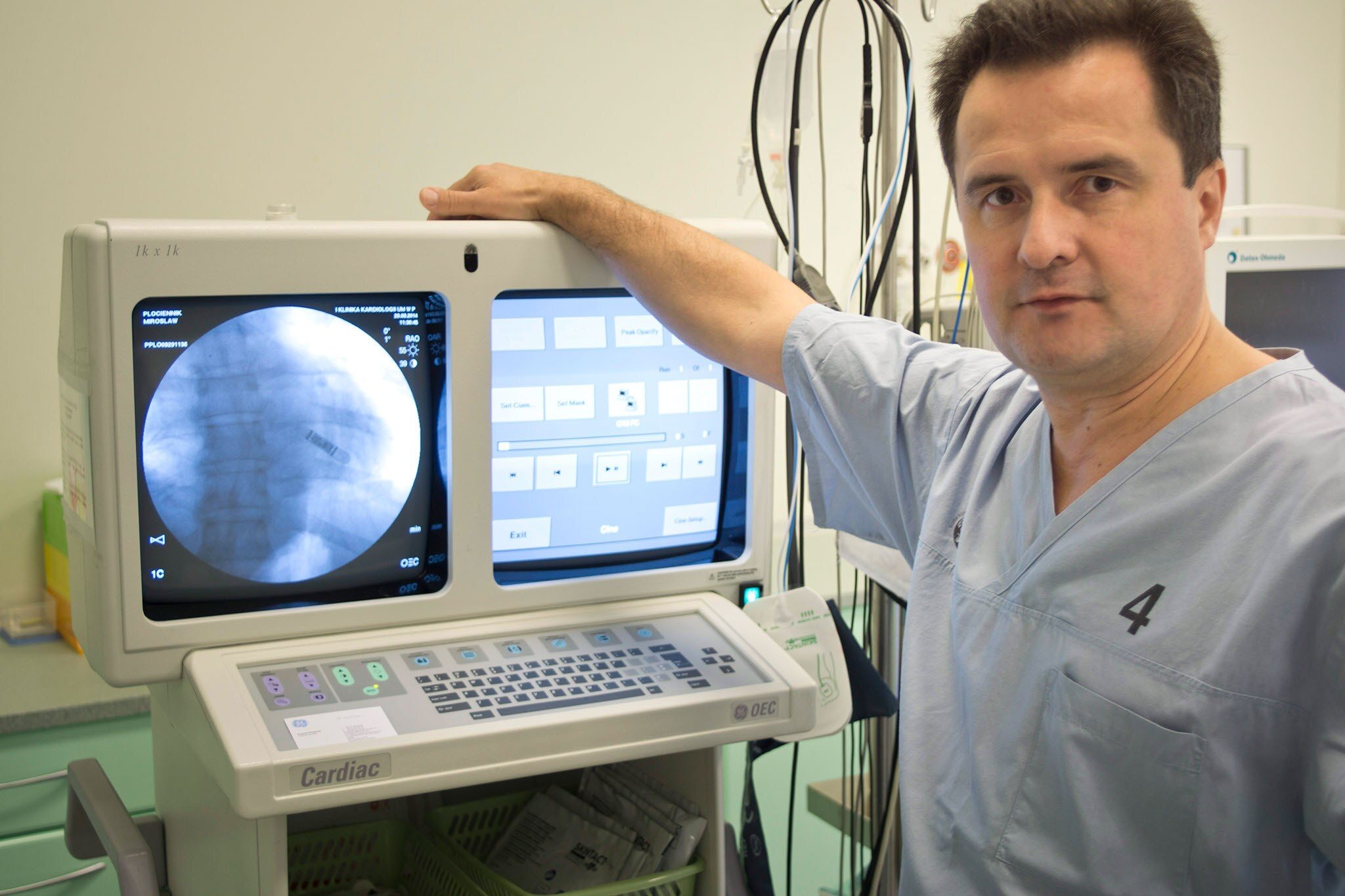We can be proud of the achievements of Polish cardiologists. “Let’s invest in research and young scientists”

Polish cardiology is important in the world. It was a good idea to create an agency financing non-commercial clinical trials. Thanks to this, we can not only conduct research for the industry, but also implement our own scientific ideas. We are also proud of our young scientists – says prof. Przemysław Mitkowski, one of the most outstanding Polish cardiologists.
Katarzyna Pinkosz, Wprost: We usually say that Poles die too often and too early from heart diseases, which is mainly caused by lifestyle errors. However, Polish cardiologists know perfectly well how to treat heart diseases, and they also have achievements that are changing global medicine. Which have been the most important in recent years?
Prof. Przemysław Mitkowski: Polish cardiologists are an important group in the international arena. In recent years, there has been incredible progress in terms of the level of domestic scientific works – publications with the first authorship of Polish cardiologists are increasingly appearing in significant foreign scientific journals.
It is worth mentioning the works of prof. Piotr Ponikowski, who together with his team, including prof. Ewa Jankowska, published the results of important research on the introduction of new therapies in heart failure, including iron supplementation in patients with this disease. This work is widely discussed, and its conclusions are included in the recommendations of the European Society of Cardiology.
Also important are the works published by the team of prof. Marek Jastrzębski, who deals with various aspects of clinical application and deeper understanding of the mechanisms of constant stimulation of the cardiac conduction system. His multicenter MELOS study concerns the possibility of using left bundle branch stimulation in patients who already have indications for cardiac pacing, although they do not yet have heart failure, as well as in patients who already have heart failure in order to correct intraventricular conduction disorders.
We can also boast about the research of the Silesian-Kraków-Warsaw group with prof. Mariusz Gąsior, prof. Krystian Wita, prof. Jacek Legutko, prof. Piotr Jankowski, who are the authors of the results of observations of patients participating in the KOS-Zawał program. These are just a few examples – it is impossible to list all significant publications here.
The implementation of the KOS-Zawał program turned out to have as positive effects as taking medications?
It turned out that the organizational change led to a huge improvement in prognosis. Closer supervision of the patient and active management in the first period after a heart attack brings incredible results.
Polish cardiologists also participated in the creation of treatment guidelines of the European Society of Cardiology?
We can be proud of this. Last year, there were four new guidelines from the European Society of Cardiology, plus one update. Poles took part in their creation. Prof. Sebastian Szmit is a co-creator of recommendations in the field of cardio-oncology. The European Society of Cardiology (ESC) has developed guidelines in this area for the first time. This is important both for science and for modern medicine, which is intended to improve patient prognoses. For every scientist, it is a source of great satisfaction to participate in the bodies that edit guidelines and, additionally, to have their works cited as the basis for creating these guidelines. Prof. Ewa Jankowska participated in the creation of recommendations regarding acute coronary syndromes (as well as in updating the guidelines for the treatment of heart failure), prof. Maciej Lesiak is the co-author of guidelines on cardiodiabetology. In turn, prof. participated in the creation of the recommendations of the European Society of Hypertension. Krzysztof Narkiewicz.
It is worth emphasizing that we are one of the first in Europe to take part in the introduction of new technologies: they often appear in Poland in selected centers already in the first month after the new technology is approved by the European registration agency. We also often help in the implementation of new technologies in other European countries, being the so-called advisory doctors (proctors) who support doctors in other countries in performing the first procedures on patients. This is, of course, done after they complete theoretical and practical training on simulators and animal models. Last year, for example, I helped to open centers implanting electrodeless stimulators, among others. in Montenegro and Serbia.
The European Society of Cardiology is impressed by the model of cooperation developed in Poland by PTK with representatives of the Ministry of Health and government agencies in the field of medical care. Our public debates, also during the PTK congress, are beginning to become a model for many European countries.
So there is modern, world-class cardiology in Poland?
I must say that when I participated in the creation of the position of the American Heart Rhythm Association several years ago, I was inspired by the working methods of the Americans and, above all, their approach to science and to people who may not be very famous yet, but want to change something. They don’t ask, “Where are you from?”, they ask, “What are you bringing?” I would like us to also start thinking that what we have to contribute to universal medicine is important.
We don’t have to have any complexes about being from Poland; we are able to perfectly organize many excellent studies and publish their results. It was a very good idea to create an agency financing non-commercial clinical trials. Thanks to this, we can not only conduct research for the industry, but also implement our own scientific ideas that are the result of our knowledge and experience.
What support would Polish cardiology need to develop even better?
The basis is financing good research, which is the idea of Polish scientists. The second thing is the possibility of quickly introducing innovative technologies, perhaps e.g. in cardiology centers of excellence, i.e. in selected centers that should not worry about financing the introduction of new technologies, not yet reimbursed in Poland. Unfortunately, we still have a problem with this. Together with the Ministry of Health, we will have to find a way to quickly introduce innovative diagnostic and therapeutic solutions in selected centers, and then – once we have checked their effectiveness in Polish patients – prepare recommendations for the reimbursement of these technologies throughout the country.
The 30 Club operates within the Polish Society of Cardiology, bringing together young Polish cardiologists. Are they already scientifically successful?
They are a huge potential and pride of Polish cardiology and Polish science. Club 30 PTK brings together young Polish scientists with significant scientific achievements achieved before the age of 35. I am full of admiration for their enthusiasm, motivation, ideas and incredible energy. Many of them publish in excellent journals, initiate multi-center research, and their results win awards at international congresses, e.g. Dr. Konrad Pieszko from Nowa Sól. If I were to list the actions that should be taken to develop Polish science and Polish cardiology, investing in young scientists is certainly one of them.
It is also worth thinking about educating young staff in extremely sophisticated procedures – this will largely apply to pediatric cardiac surgery. The cost of surgery in a child with complex defects in the USA or Western Europe is very high and would allow up to three young Polish doctors to be sent on scholarships to leading centers who could learn how to perform this type of surgery. During a meeting with the national consultant in the field of pediatric cardiology, Dr. Maria Miszczak-Knecht, I thought that these should be scholarships funded by the Ministry of Health or the National Health Fund, which pays for surgeries performed abroad. It would be important to train young doctors and then encourage them to stay in centers that will deal with the most difficult cases. Looking at the enthusiasm of young people, I am convinced that they will make good use of their time abroad and that the investment in their development will pay off very quickly.
Prof. Ph.D. n. med. Przemysław Mitkowski, head of the Cardiac Electrotherapy Laboratory at the University Clinical Hospital in Poznań, president of the Polish Society of Cardiology in 2021-23. He is a member of the European Society of Cardiology, the Polish Society of Hypertension, the European Heart Rhythm Association (EHRA), the European Heart Failure Association (EHFA), the European Association for Cardiovascular Intervention (EAPCI) and the American Heart Rhythm Society (HRS). His clinical and research work includes, among others: cardiac arrhythmias, non-invasive electrocardiology, implantable heart electrotherapy devices and invasive treatment in ischemic heart disease. “A hard worker, with hands that can operate on the most diseased hearts.” In his free time, he loves traveling, taking photos and practicing sports shooting.






